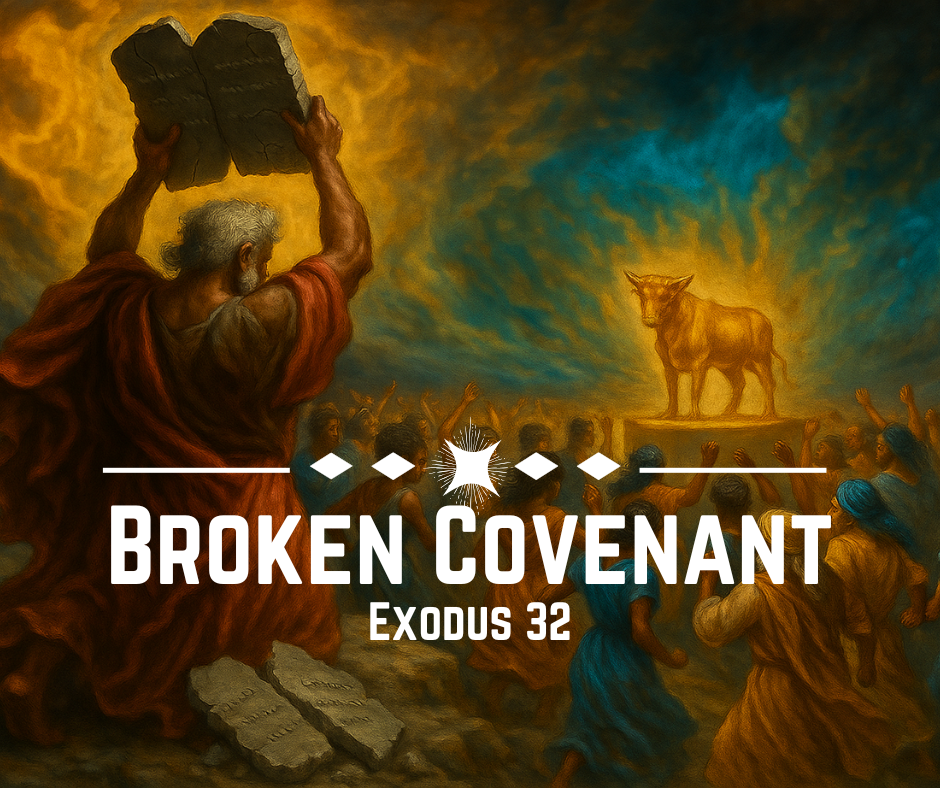As we have studied the Exodus, we’ve discovered much, especially the similarities between what the culture was for the Israelites and what it is for us now. They lived in an environment that was oppressive and hostile, something that is increasingly true for modern-day believers. Egypt represents a world system and culture that is anti-God, much like today’s culture. God used this to create a distinction between Egypt and its world system and the Israelites. Though the Egyptians and the Israelites lived in the same place and time, under the same ruler and culture, their experiences were completely different, and it opened the door for the Israelites to trust in their God. In fact, trust was all God required of them.
Through the exodus from Egypt, we see the Israelites trust God and He moves in mighty ways, then we get to Exodus 32 where they make some disastrous decisions. In Exodus 32, the Israelites were still at Mt. Sinai, where God had brought them to Himself, the place they saw and heard God. It was a big deal, as Deuteronomy 5:26 testifies, “For what mortal has ever heard the voice of the living God speaking out of fire, as we have, and survived?”
We often talk about the presence and power of God in our lives, but we fail to discuss stewarding the move of God in our lives. The nation of Israel did not steward it well because after all they had seen God do in their lives, in Exodus 32, they make some disastrous decisions. Moses called their decisions “a great sin” in Exodus 32:31 and again in Exodus 32:30–31. Why? Their decisions were a great sin because of who they were – His chosen people, His Holy Nation, His Royal Priesthood. Their actions were a great sin not only because of who they were but where they were – they were still at Mt. Sinai where they had encountered the Lord, where they had promised to trust Him and obey His commands. Instead, they made a golden calf, worshiped it, and indulged in a sensual celebration of their actions, breaking at least three of the commandments.
The Israelites did all this after everything God had done for them – they took the goodness of God for granted. Let us look at all God has done for us and pray we never take His goodness for granted.
Through the exodus from Egypt, we see the Israelites trust God and He moves in mighty ways, then we get to Exodus 32 where they make some disastrous decisions. In Exodus 32, the Israelites were still at Mt. Sinai, where God had brought them to Himself, the place they saw and heard God. It was a big deal, as Deuteronomy 5:26 testifies, “For what mortal has ever heard the voice of the living God speaking out of fire, as we have, and survived?”
We often talk about the presence and power of God in our lives, but we fail to discuss stewarding the move of God in our lives. The nation of Israel did not steward it well because after all they had seen God do in their lives, in Exodus 32, they make some disastrous decisions. Moses called their decisions “a great sin” in Exodus 32:31 and again in Exodus 32:30–31. Why? Their decisions were a great sin because of who they were – His chosen people, His Holy Nation, His Royal Priesthood. Their actions were a great sin not only because of who they were but where they were – they were still at Mt. Sinai where they had encountered the Lord, where they had promised to trust Him and obey His commands. Instead, they made a golden calf, worshiped it, and indulged in a sensual celebration of their actions, breaking at least three of the commandments.
The Israelites did all this after everything God had done for them – they took the goodness of God for granted. Let us look at all God has done for us and pray we never take His goodness for granted.

